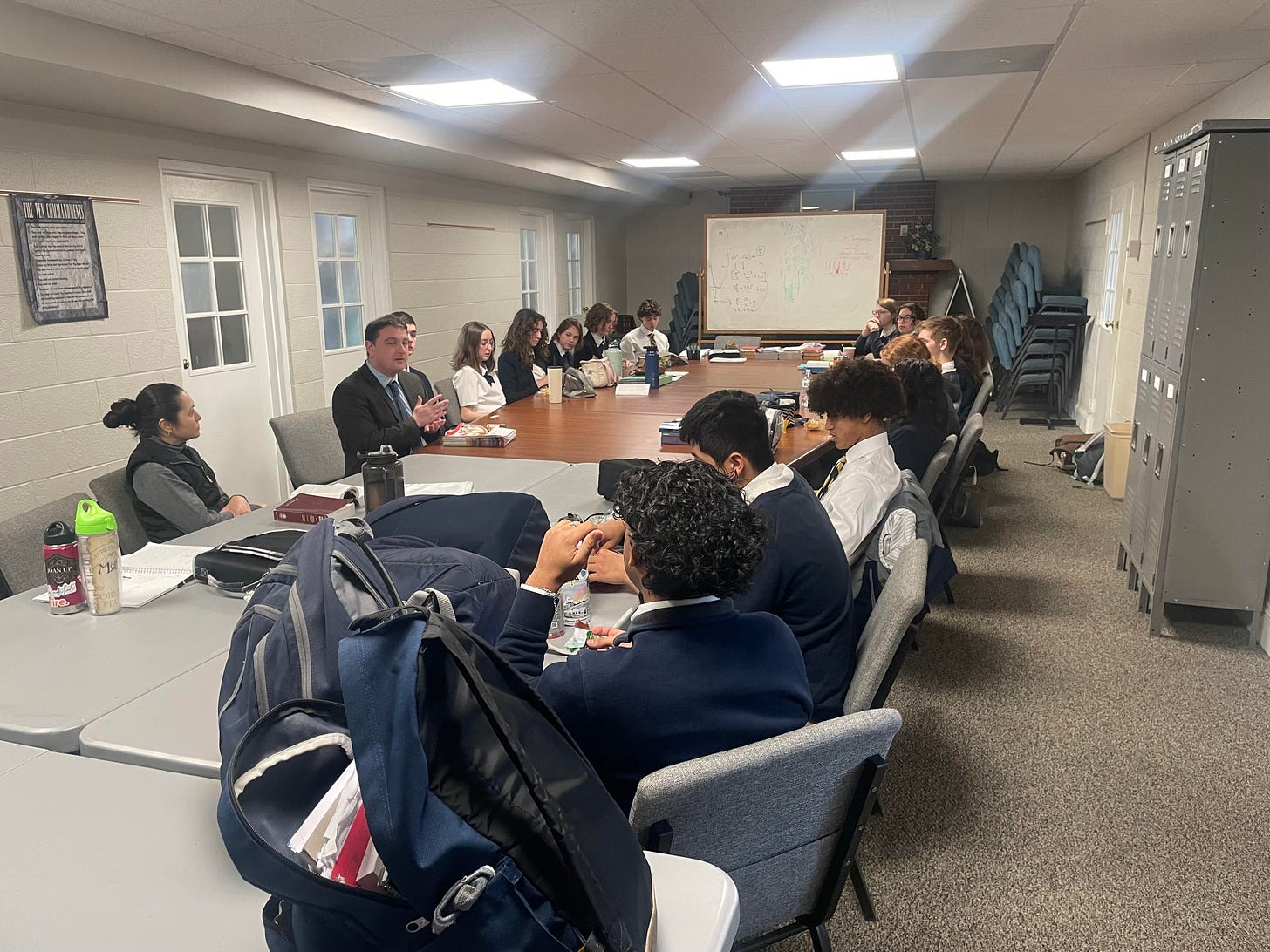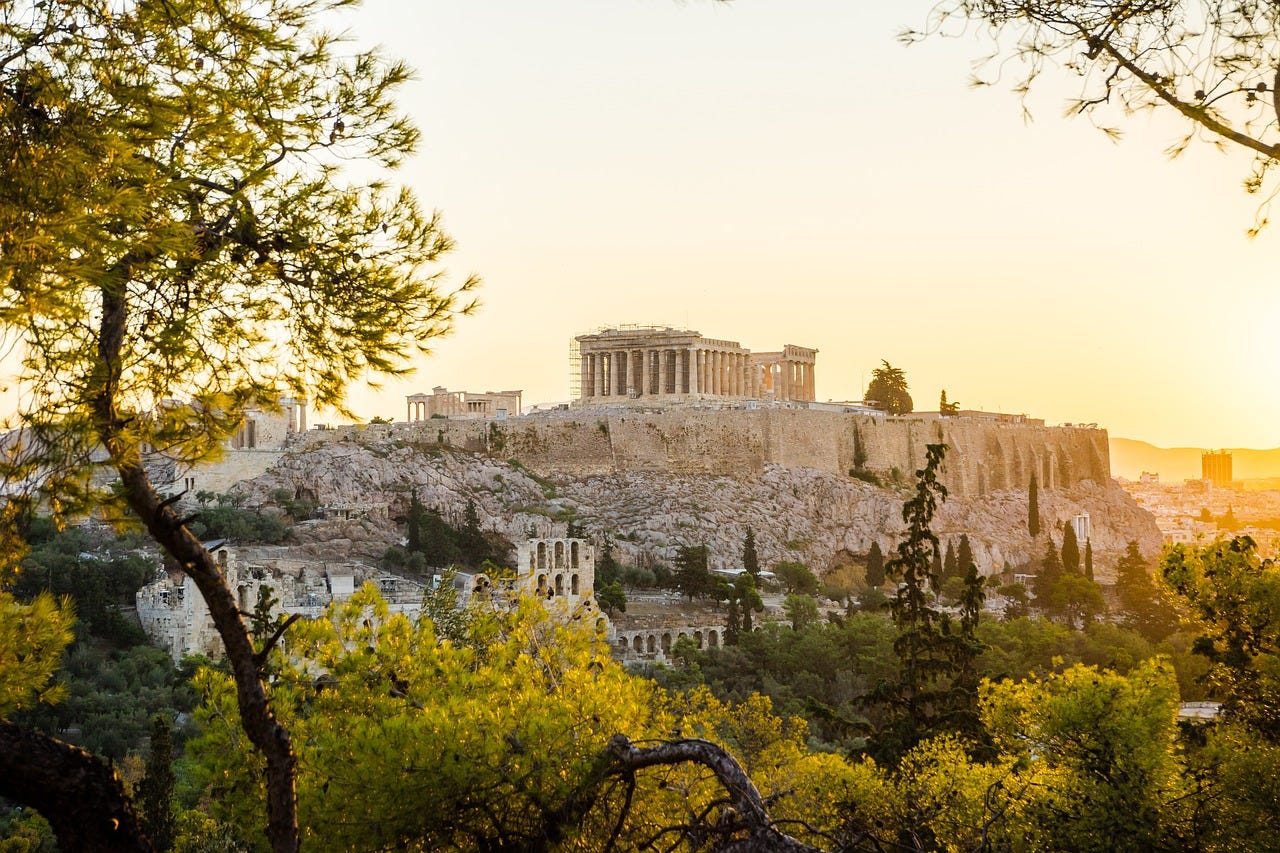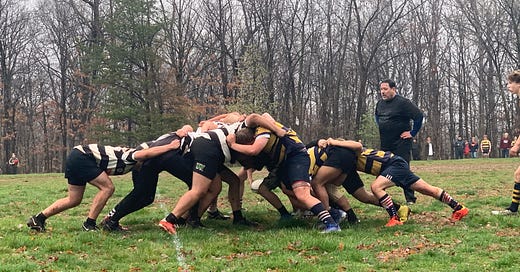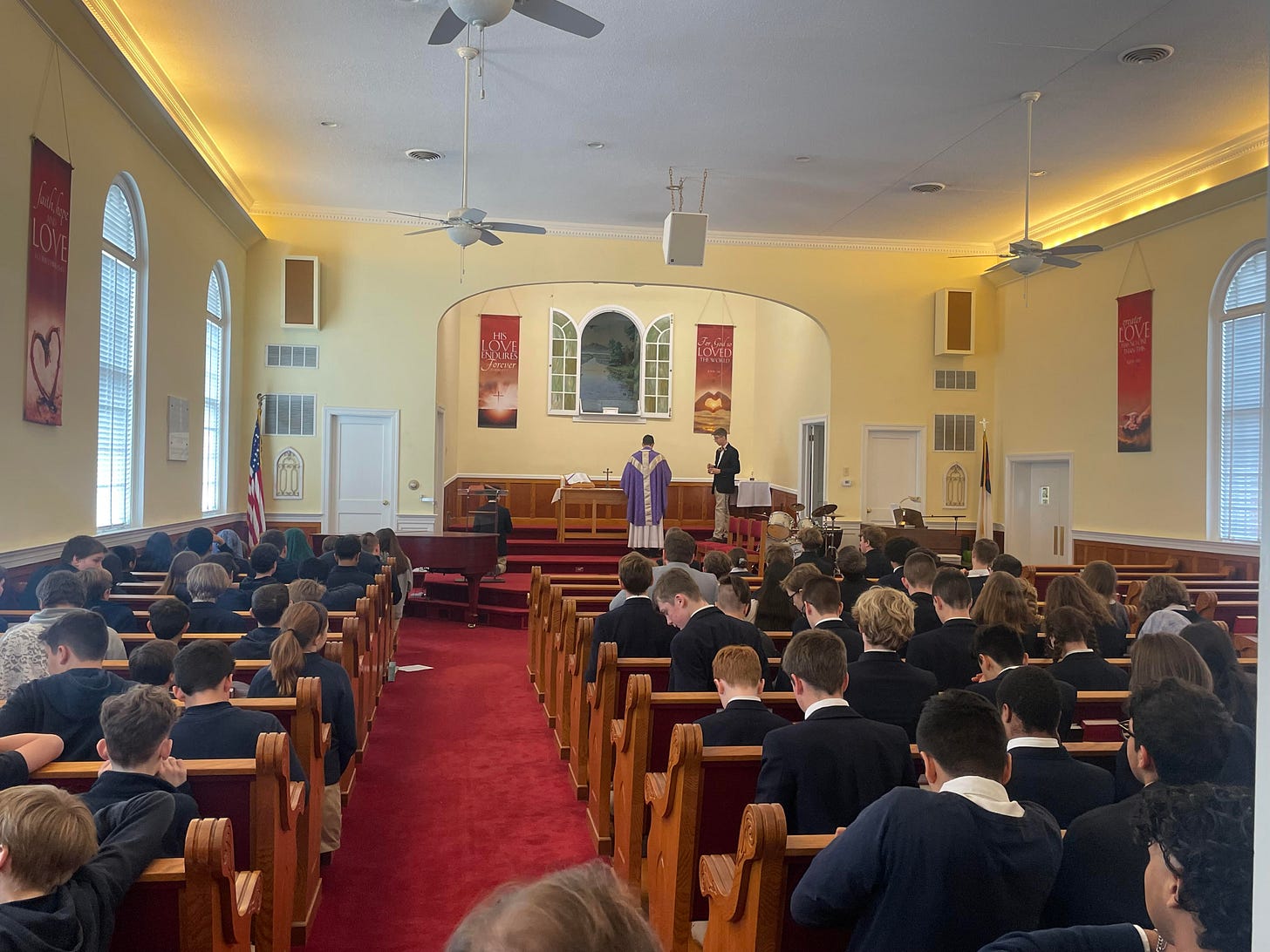Post VII: Admissions Season at The Summit
Admissions, spring sports, and a reflection on our place in modern culture
Welcome back to A View from The Summit. The Summit Academy is a classical liberal-arts school rooted in the Catholic tradition, located in historic Fredericksburg, Va., serving students in grades 6-12. This newsletter informs readers about our school and the ways in which it is helping renew education and the Church.
If you’re enjoying this newsletter, please consider sharing it today using the button below. As I’ve mentioned before, this group of readers is quite diverse and growing quickly. We have 85 subscribers across 19 states, and we are starting to welcome new readers from other newsletters that are recommending us. This is a very exciting time for education—let’s keep the momentum going!
Also, it has recently come to my attention that this newsletter may be getting caught in your “Promotions” folder, so please check and make sure you catch up on those editions, as well as mark them so they no longer redirect there.
Administrative review:
Last week, a team at The Summit met several times to review admissions interviews with prospective students and parents, make admissions decisions, and send admissions letters. While we do not have final admissions numbers, it’s worth highlighting that we received nearly 30 new applications before the priority deadline. That’s quite remarkable for a school with a current enrollment of 112 and a facility-maximum enrollment of 125, and we are starting to see more applicants from nearby college prep, other private, and Christian schools. We’re far from the only school to experience this growth. Documenting the ascent of classical liberal-arts education, First Things columnist Mark Bauerlein noted, “What has happened right in front of us in so short a time is a declaration of faith. That’s how we should understand the growth—as a trust placed in the schools and in the Church.”
While I was not involved in admissions decisions, I did have the privilege of sitting in on some of these discussions. Two things were clear. First, that parents—their character, their outlook, their willingness to partner with the school—are integral to the admissions decision of a mission-focused school such as The Summit. Second, the achievements and maturity of any given student are not as important as his or her willingness to grow. There’s a tendency within schools like ours to think that kids will behave like saints. But, of course, kids will be kids. The purpose of a good school is not to demand perfection here and now but rather to help students grow, giving them what they need to flourish in the years ahead—to help them love the right things and to desire to walk in the way of love.
Speaking of the future, college visits are starting up. Two weeks ago, a representative from Thomas Aquinas College visited our students, and yesterday, a sizable group of our upper-school students enjoyed an informative discussion with Dr. Tom Varacalli, an assistant professor in Belmont Abbey College’s Honors College. He emphasized the ways in which the BAC Honors College experience builds upon a Summit education, including the chance to dive deeper into the Great Books and grow in community with faculty and students.

Yesterday we had all-school mass. As many of you know, The Summit currently rents facility space in a Baptist church while we make plans for our own permanent campus. We were blessed last year to receive Bishop Burbidge’s permission to have mass celebrated in the rented space, and we are likewise fortunate to enjoy the Christian fraternity of the church’s pastor. With assistance from priests of the many parishes in our region, we are able to have all-school mass monthly. This time, Fr. William Nyce from St. William of York Parish visited us to celebrate mass. His homily stressed the importance of humility and how by becoming humble we dispose ourselves to God’s grace.
It occurred to me during his homily that there are few better ways to develop a sense of shared mission than for students and teachers to worship Jesus Christ in the mass, standing and kneeling together, all receiving the same Eucharist. It has been said of friendship that it involves two people looking out towards the same good. It is good for teachers and students to develop a kind of friendship, appropriate to their stations. Through these and other rituals, we develop an orientation towards the divine that permeates our community.
Faculty & curriculum insight:
This week’s reflection is written by Mr. Julian Sicam. Mr. Sicam arrived at The Summit in August 2023 after having served as headmaster at a Catholic classical school in the Midwest. A graduate of Benedictine College, he now teaches Latin and Math at The Summit. He is also pursuing a doctorate through the Center for Thomistic Studies at University of St. Thomas–Houston. His first reflection article for this newsletter can be found here. His reflection for this edition is below:
As an institution that educates students liberally and classically, The Summit and its teachers see it as part of our responsibility to bring about change in our present culture, not only for the good of our own families, but also for the good of the country and of the Church. But it’s one thing to recognize a change is needed; it’s another thing to bring it about, and in the right way. To do that, however, it will be helpful to have a clearer idea of what exactly we are trying to change. What is culture, anyway?
In common parlance, many refer to “culture” with regard to the parts of a society that are sensed when traveling. We speak of “experiencing the culture” upon experiencing, for example, the food, the landmarks, the art, and so on. But it’s not that these things aren’t culture, which is to say, that they don’t have anything to do with culture. There is something reasonable in detecting something of the culture of a people in these things. But what that is exactly is hard to pinpoint. We may be hesitant to say that the whole of culture consists in these things.
Of course, what the whole of culture is would be too great a question to answer in this humble essay. But perhaps by examining particular aspects of it, we might come away with something helpful in the mission of changing the culture. The particular aspect of these things—food, art, etc.—to be considered in this essay is custom.
Xenophon, in his Constitution of the Lacedaimonians (some of which the sixth graders got to read), opens by mentioning his wonder at the reputed strength of the Spartans. It was his examination of their customs, however, that brought his wonder to a close.

When it came to the education of boys, for example, the Spartans did not allow them to wear shoes, so as to harden their feet, allowing them to traverse difficult terrain more nimbly; nor were they permitted to wear more than one article of clothing throughout the year so that they would be better able to weather harsh environmental conditions. Furthermore, if they wished to eat more than their strict diets allowed, they were taught to steal it, though they would be punished upon being caught. This was to make the boys more resourceful “and better fighting men.” Beyond boyhood, if a man proved to be a coward in battle, he was compelled, among other things, as he grew old, to explain to the old maidens in his household why they were unwedded, since no man would want to marry into the family of a coward.
These are but a few of the Spartan customs Xenophon lists in his work. We may find them somewhat off-putting. But regardless of how strange they may seem to us, more importantly, they tell us about the character of the Spartan people. It should be no wonder, with institutions such as these, that they gained a reputation for being a warlike people who treasure the glory of victory in battle above all else. It is this, say many, that made the Spartans the kind of people that they were: it was a part of their culture.
My point is that it is not the customs themselves, but what the customs are ordered to that tell us about the culture, the character of a people—namely, what they hold to be the highest human good. The Spartans (so we are told) were a bellicose people who saw the highest human good as glory in war, and so they structured their institutions around this conception. The result is their culture.
Culture, then, at least in part, is the face of a society’s common conception of the human good, given expression in its customs and institutions; culture, therefore, is inherently moral. Our culture and our customs are a reflection of what we hold most dear.
So how is the battle over our present culture won? Or, in the same vein, where is it won? Well if culture is founded fundamentally at least in part on the moral principles of a society, it is won in no small part where those principles are first learned: at home and in school—i.e., in education. It is in education that we form our children into the sort of people we want them to be. Regardless of what one might think about the Spartans, they knew this well.
To close, I would encourage the reader to take part in the ever-fruitful practice of reflecting upon one’s own moral life. Such reflection our society sorely needs. What kind of a people are we? What do we hold most dear? What are our principles? Who might we imitate, look to as a guidepost?
Well, despite their strangeness to us, a good place to start (but not necessarily to end) might in fact be the Spartans. For perhaps they weren’t purely bellicose, and perhaps glory in war was not what they held most dear. Having discussed the Spartan system of education and how it differs from other Greek states, Xenophon tells us, “Which system turns out men more obedient, more respectful, and more strictly temperate, anyone who chooses may once more judge for himself.”
Co-curricular highlights:
Spring sports are underway. Rugby and girls’ soccer matches are starting, and this year The Summit has launched a new golf program. The Summit’s rugby program is several years in; we even have regular scrimmages with alumni. It is said that rugby is a hooligan’s sport played by gentlemen. Although I have never played rugby, it does seem a great game. To practice well, you need to show up, listen, and try. To win, you need to forget yourself and devote yourself to others. And since it is an especially physical sport, the team needs grit, determination, heart, and unity. In many ways, this is what a man needs in life, and so we see how what happens on the field reinforces personal growth in the classroom, at home, and in the school community. I’ll leave you with what one seventh-grader confidently told me when I asked what happened to his knee: “Rugby. Only real men play rugby.”
Ms. Sarah McBride and Ms. Genevieve Riley—both Summit instructors and former DII soccer players—are coaching the girls’ middle- and upper-school soccer teams. “Our teams are beginning regular season play this week. Our goal for this girls’ soccer program is not only to foster a passion for this beautiful game,” they shared with me, “but also to instill values of teamwork, discipline, and resilience that extend far beyond the field.”
Reflecting on soccer’s connection to the classroom, they offered: “In the same way that the goal of classes is more than just to ‘get a good grade,’ our vision for this season transcends the scoreboard. We aim to cultivate a culture of excellence where every player is given the opportunity to reach her full potential and become the best version of herself.”
What we’re reading now:
I’ll make another plug here for my upcoming parent reading group book, Prudence: Choose Confidently, Live Boldly (OSV, 2022) by Fr. Gregory Pine, O.P. The reading group will convene at The Summit on March 20 at 7p.m. We’ve emailed reading questions to parents, and each chapter concludes with questions for personal reflection as well. This book communicates the foundation, substance, and ultimate purpose of virtue in a compelling, accessible manner. Along with parents, The Summit aims to equip students to develop virtue, and we can only do so if we ourselves are growing in virtue.
On contemporary issues, this recent article by the indispensable Ryan T. Anderson covering Alabama’a IVF controversy is well worth reading. Characteristic of Anderson’s approach is his rare combination of humility, courage, and compassion. He advocates the truth with a deep understanding of all sides of an issue and a charitable disposition towards those with whom he disagrees and, in this way, is an example for us in our conversations about politics.
Also, this article covering Amy Edmundson’s theory of organizational health is essential reading for managers, leaders, or executives . . . and perhaps even parents. Edmundson gives direction for building organizational health through the cultivation of a safe and honest environment. Her insights are for the workplace, and we at The Summit have read and used them, but may be useful for the family context as well.
I’m also reading David McCullough’s 1776, which provides a narrative of how the American Revolution began, the key players involved, and the complex dynamics in the colonies, in England, and among European nations. My wife and I have been on a kick of learning about Colonial America, and we have found that there are fewer better places to do so in and around Central Virginia.
If you are enjoying this newsletter, please consider subscribing via the button above and sending it along to others who might be interested. Revenue from paid subscriptions will support The Summit Academy of Central Virginia.





